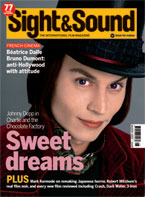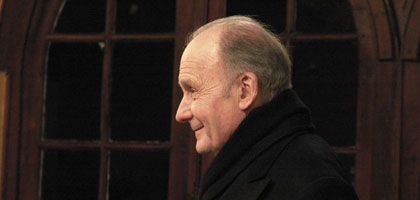
The last president
Film of the Month: The Last Mitterrand

Robert Guédiguian turns a book about the scandals of the Mitterrand era into a meditation on memory, power and death. By Ginette Vincendeau
Robert Guédiguian's The Last Mitterrand (Le Promeneur du Champ de Mars) is an unexpected film, both as the first French film about one of the Republic's heads of state and for the departure it marks in the work of its director, who is best known for his humanist tales of colourful Marseilles street life in such films as Marius et Jeannette. The Last Mitterrand also sees the return to the screen of the magisterial Michel Bouquet in the title role.
Guédiguian's film is loosely based on Georges-Marc Benamou's book Le Dernier Mitterrand. In the film Antoine (Jalil Lespert), a stand-in for Benamou, interviews the president during his last months in office in order to write a book. Although the name Mitterrand doesn't figure in the film (or in the original French title), there is no doubt whom we are talking about. Bouquet's resemblance to the late Mitterrand is extraordinary. It is also public knowledge that the socialist president's death in January 1996 was caused by prostate cancer. Benamou's book, when it came out later that year, was a huge succès de scandale for its revelations about the president's embattled political life, the financial scandals associated with his regime, his arrogant intellectualism, his dubious behaviour during the German Occupation, the impact on his entourage of the public disclosure that he had an illegitimate daughter Mazarine, and even his culinary tastes. The book infamously opens on a scene during a New Year's Eve supper in which the dying Mitterrand gorges on ortolans, an aristocratic delicacy consisting of specially fattened sparrow-sized birds (a protected species) consumed whole according to an elaborate ritual.
Mitterrand's widow Danielle and various personalities including former minister for culture Jack Lang tried to stop the film from being made because of the potential damage to its subject's reputation. Some members of the president's circle, including minister Michel Charasse, even took action to have their names removed. They need not have worried. Guédiguian and Benamou's adaptation strips the book of most of its scurrilous details and goes instead for a sombre reflection on power, memory and death as the ageing politician stoically confronts the deterioration of his body and his impending demise. Whether he bowed to pressure or not, Guédiguian claims that he always wanted "to render an idea of Mitterrand rather than Mitterrand himself."
The Last Mitterrand is no ordinary biopic: little is made of its subject's private life; his inner circle is absent and his womanising is signified only by a few phrases about female beauty; and the Mazarine affair becomes paternal pride at her brilliant school results. Nor has Guédiguian made a film about political discourse or French party politics - hardly any living politician is mentioned and Mitterrand's move from right to left in the post-war period, the historic alliance between his socialist party and the communists in 1972 and 'details' such as his regime's use of phone tapping are alluded to only in veiled terms, for which Guédiguian has been reproached in France.
Instead, The Last Mitterrand deals with the difficulty of reclaiming, understanding and recording the past, hence the enhanced role of the writer, the importance of books, letters and photographs and the role of live witnesses, all of which are simultaneously evidence of the past and signifiers of its elusiveness. The grand presidential offices (standing for the Elysées palace) similarly denote both power and its transitory nature, much as the film's blue-grey palette echoes the president's crepuscular view that France's dominant colour is grey.
Yet history does not disappear from the film. Most obviously it is represented by Antoine's obsessive quest to find out about the president's behaviour during the German Occupation, and here 'Mitterrand' becomes an emblem for the nation and its continued difficulties in coming to terms with those dark years. The Last Mitterrand also evokes - again, somewhat allusively - the conflicted nature of the left in power during the Mitterrand era through the fictional subplot of Antoine's girlfriend Jeanne (Anne Cantineau) and her 'old-fashioned' communist parents with whom Antoine likes to argue. This is also the point of the repeated shots of workers watching 'Mitterrand' as he addresses them at a run-down colliery in Northern France, the site of an earlier mining tragedy. Their unmoved expressions speak of their distance from this representative of la gauche caviar (champagne socialism) as he speaks of "class struggle" in an area where traditional employment has vanished. Guédiguian's own communist sympathies explain these evocations of the old left, though here they are more discreet - and disillusioned - than in his Marseilles films. Neither hiagiography nor serious indictment, The Last Mitterrand portrays the president as a cold, intellectual, patrician figure, equally alienated from the grassroots and from the right-wing bourgeoisie for whom, as he puts it, he can only be a class traitor.
But history comes to life in the film most powerfully through the outstanding performance by Michel Bouquet, a veteran of the French stage and screen whose great film roles date back to his work with Claude Chabrol in the late 1960s and 1970s. In the 1970s Cahiers du cinéma writer Jean-Louis Comolli described well-known actors in historical fictions as "a body too much" which gets in the way of the historical figure, but Bouquet's performance, both self-effacing and self-consciously distanced, resurrects the late president more hauntingly than if he had tried to mimic him in a conventional way.
As so often in historical fiction, the personal here upstages the political. While The Last Mitterrand shows the president's political slipperiness and delusions of grandeur (his alignment with the French kings in the crypt at Chartres cathedral [Saint-Denis in the book] underlining his regal pretensions), this is essentially a film about a tragically suffering human being. Yet Mitterrand's view that he is "the last of the great presidents", the last representative of the nation before its engulfment by Europe and globalisation, resonates today. So does his final address to the nation on television, in which he indicts the human cost of the ultra-liberal economy, a view that rings sadly true ten years on.
